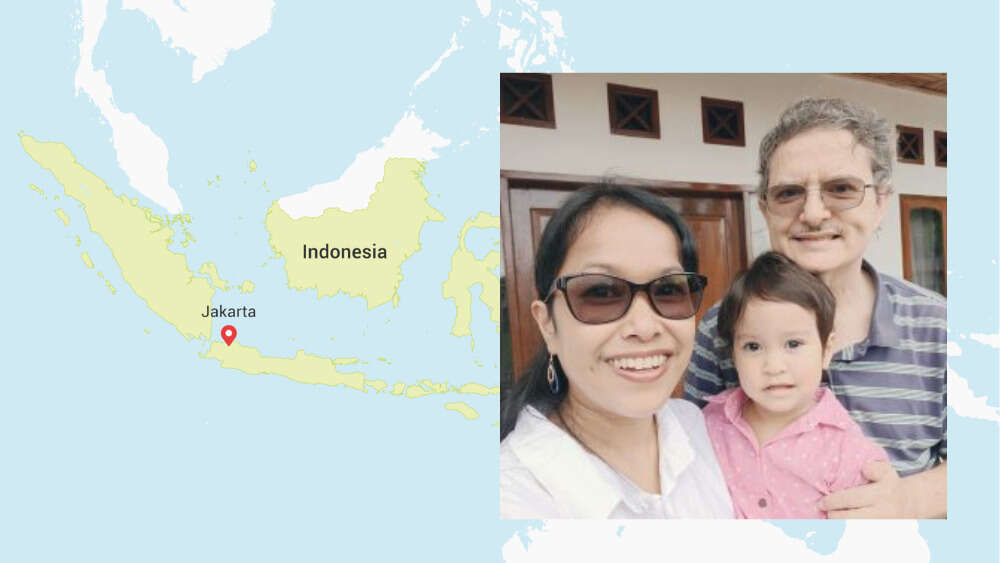Andrew Buchanan and his wife Abi Tandiseru are missionaries with the Church Missionary Society (CMS) in Toraja, Indonesia. Andrew teaches biblical studies, primarily in the post-graduate department of a government-run Christian institute. He is also involved in various writing projects for the church. Abi disciples children in the local church, while they both seek to build relationships in their neighbourhood.
I live with my wife and toddler in Toraja, a rural Christian enclave in predominantly Muslim South Sulawesi, Indonesia. For most of the past 20 years, I have been teaching theology students or graduates who are connected with the local ethnic Protestant denomination, whose adherents make up about half the local population. Most of the rest belong to other Christian denominations, with a few pockets of traditional religionists and significant Muslim minorities in the main towns.
My journey towards overseas service began when I was a university student, where both at church and on campus, I regularly heard missionaries talking about the needs and opportunities for service in various parts of the world. In both contexts, I was also personally encouraged to consider full-time ministry, and after a few years in a secular job, I went to Moore Theological College.
My greatest interest was biblical studies, and it turns out that taking seven semesters of subjects in both Greek and Hebrew vastly exceeds the normal pattern of biblical studies in theological education in Indonesia. When I began my ministry in Toraja, two things stood out: my confidence in teaching both Old and New Testament, and my singleness.
I heard rumours that being single and male could be an issue in some cases.
For most of my journey to the mission field, my singleness had played little role in my thinking. My desire to teach on the mission field was sparked by a sermon in my first year at college from a recent graduate about to go out with CMS to teach theology in Indonesia. During my four years as an assistant minister, I worked on a Master’s in Theology and met with CMS people several times to explore options. The first time I remember singleness coming up as an issue was when it was suggested that I go to Toraja by OMF leadership in Indonesia at the time. They had two older single women serving there (one of them at my college), and they considered the local culture welcoming.
Later, I heard rumours that being single and male could be an issue in some cases. Perhaps, having been single without scandal through college and in ministry with youth as an assistant minister, and being in my mid-30s, I was considered a safer prospect than a young guy fresh out of university. In any case, the placement was wise. The fellowship with my two fellow missionaries was a huge help in processing culture stress, and the college where I taught had a collegial atmosphere where I was welcomed and valued. The local IFES-affiliated student fellowship (Perkantas) also provided like-minded local fellowship and some housemates for the large house that had been found for me to rent.
Over ten years later, I successfully proposed to one of the women active in that movement, to everyone’s surprise (my surprise was that she accepted). The local reaction could best be described as relief from a serious cognitive tension, namely how I had resisted the charms of so many attractive local women over the years. At least twice there were well-considered attempts to set me up with someone suitable. When visiting friends from my old congregation in Sydney, I discovered that some of them had similar concerns. One older lady told me my marriage was an answer to her prayers of nearly two decades!
Being married to a local has not eliminated my other points of difference …
It was kind of people to care, but the comments did seem to confirm my sense that single people were a point of concern for many others in the church. I suspect I was shielded from many of the dynamics that single people report because having a ministry position provided an understood framework for relating with me. That didn’t really change in Toraja. They were used to missionaries being different and had one or two examples of single male missionaries serving well in theological education.
Being married to a local has not eliminated my other points of difference, some of which are weaknesses in this context and some of which are helpful complements. It has, however, given me an additional window into life here. Other windows in early days included my fellow missionaries, colleagues, housemates and then a group of ministers who came to a Bible study I led. Later on, I was involved in a program for ordination candidates who serve in local congregations as part of their training, and I learned a lot about the particular challenges of congregational life here. Now, I see the same things from the vantage point of a particular extended family. It is much the same picture, even if there is more detail at certain points.
All this is to say that my marital status – either way – has not been that significant for my ministry. What has been most significant, as a point of complementary difference with my local context, has been my biblical training. Whether in my official job (once various permissions come through) teaching in a New Testament Master’s program, or my blog providing exegetical/hermeneutical notes for the denomination’s set reading for the Sunday sermon, or for the Bible study that a group of elders at our local church asked me to lead, the Lord has provided avenues to use the gifts he has given me where he has placed me.
Email This Story
Why not send this to a friend?


